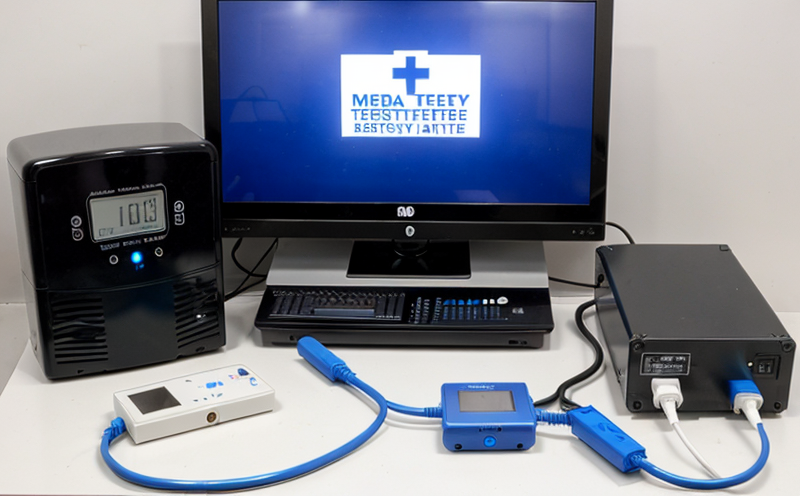IEC 60601-2-24 Infusion Pump Battery Testing
The IEC 60601-2-24 standard is a crucial document for ensuring the safety and performance of medical devices, particularly those that rely on battery power. This standard applies specifically to portable or battery-powered medical electrical equipment (MEE). Infusion pumps are one such device, designed to deliver precise amounts of medication into a patient's body through a syringe or catheter.
The primary focus of IEC 60601-2-24 is on the safety aspects related to battery-powered medical devices. It addresses potential hazards associated with batteries and their interaction within the device, including electrical shock risks, fire hazards, and other failures that could compromise patient safety.
The testing procedures outlined in this standard are designed to identify any deficiencies or vulnerabilities in the battery system of infusion pumps before they reach clinical use. By adhering to these stringent tests, manufacturers can ensure compliance with regulatory requirements and provide safe devices for healthcare providers and patients alike.
One key aspect covered by IEC 60601-2-24 is the evaluation of battery integrity under various conditions such as over-discharge, over-charge, and exposure to extreme temperatures. These tests help determine whether a pump's battery will maintain its functionality throughout expected operational life cycles while minimizing risks associated with malfunction.
Additionally, the standard includes provisions for assessing the effectiveness of protection mechanisms intended to prevent unauthorized access or tampering with critical functions like dose delivery settings. This ensures that only authorized personnel can adjust essential parameters, thus enhancing security and patient safety further.
Compliance with IEC 60601-2-24 not only helps medical device manufacturers meet regulatory expectations but also builds trust among healthcare professionals who rely on these technologies for critical treatments. It demonstrates a commitment to quality assurance practices that prioritize both product reliability and human health.
In summary, conducting thorough IEC 60601-2-24 battery tests ensures infusion pumps comply with international safety standards, thereby safeguarding patients from potential risks posed by improperly functioning batteries.
Scope and Methodology
The scope of IEC 60601-2-24 Infusion Pump Battery Testing encompasses several critical areas relevant to the safety assessment of portable or battery-powered medical electrical equipment. These tests aim at evaluating various aspects of the battery systems within infusion pumps, ensuring they meet stringent requirements set forth by international standards.
The methodology involves multiple stages aimed at simulating real-world scenarios that might stress the batteries beyond normal operating conditions. For instance, one test scenario would involve subjecting the device to prolonged periods without power followed by rapid recharging cycles – a common practice among healthcare facilities during extended breaks or overnight storage.
- Over-discharge: Testing how the battery responds after being fully discharged multiple times.
- Over-charge: Evaluating performance when exposed to excessive charging voltages.
- Temperature Extremes: Assessing stability and reliability at both high and low temperatures.
In addition to these environmental stress tests, there are also functional assessments focusing on the interaction between the battery and the overall system. This includes checking for any signs of overheating during operation or improper communication between the battery management unit (BMU) and other components inside the infusion pump.
Competitive Advantage and Market Impact
Adhering to IEC 60601-2-24 standards provides medical device manufacturers with significant competitive advantages in today's highly regulated healthcare industry. Compliance not only ensures that products meet strict safety requirements but also enhances brand reputation by demonstrating a commitment to quality and patient care.
- Enhanced Patient Safety: By rigorously testing batteries used in infusion pumps, companies can reduce the likelihood of failures leading to adverse events or recalls.
- Increased Market Access: Meeting international standards opens doors for exporting products globally, particularly into regions like Europe and Asia where stringent compliance measures are enforced.
Beyond mere regulatory adherence, embracing these testing protocols can foster innovation within organizations. It encourages continuous improvement in design and manufacturing processes, ultimately resulting in more reliable and efficient devices capable of meeting evolving clinical needs.
Use Cases and Application Examples
- In-home Treatment Delivery: Infusion pumps allow patients to receive necessary medications safely at home. Properly tested batteries ensure consistent delivery without interruptions, enhancing treatment efficacy.
- Emergency Situations: During emergencies or natural disasters when access to healthcare facilities may be limited, reliable battery-powered infusion pumps can provide essential care in remote locations.
These applications highlight the importance of robust testing procedures like those specified by IEC 60601-2-24. Ensuring that these devices perform consistently across different environments and conditions is paramount for maintaining high standards of patient care worldwide.





